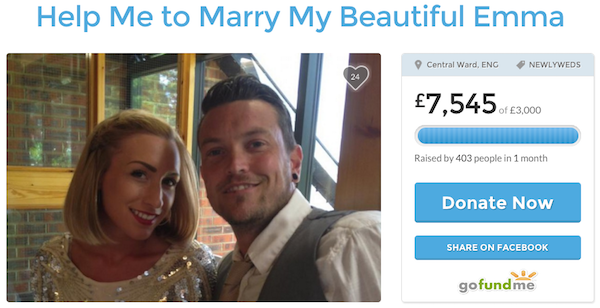You can use crowdfunding to raise money for just about anything, including your wedding. It’s not unheard of for couples to raise modest amounts of money to help pay for their big day or their honeymoon.
For example, Katherine Donahue recently raised $3,248 on Generosity for her and her husband’s honeymoon fund after getting married at City Hall in NYC.
With traditional weddings becoming less common, is crowdfunding your wedding (or some aspect of it) an acceptable thing to do?
Will your friends and family think it’s weird?
This post answers these questions, looks at some of the best practices when it comes to fundraising for your wedding online, and suggests a few of the best platform options if you’re thinking of going down this road.
First, is it tacky?
Remember, strangers aren’t going to give money to your crowdfunding campaign. Your friends, their friends, and your family are going to be contributing to your fundraising campaign.
You’re going to have to announce the campaign to your friends.
Some media publications, bloggers, and wedding planners have pointed out that this could be distasteful. Why should your family or friends donate money to your wedding?
At the same time, many couples have embraced this concept, creating an online honey moon registry with HoneyFund (couples have raised $330,715,070), or used a popular crowdfunding site like GoFundMe.
For example, Jamie & Emma raised £7,545 on GoFundMe to help finance their wedding.
Also, Maria & Dexter raised $3,705 on GoFundMe.
In some cases, using crowdfunding for your wedding can work well. More people are familiar with crowdfunding now, especially young adults, and it can save them the effort of going out and buying a gift. Plus, friends and family get to contribute in a way that is really meaningful to the couple.
At the same time, if the campaign isn’t introduced in the right way to friends, family, and guests, it can come off as “begging” “selfish” or “rude.”
It’s your job to break the news to your guests, explain to them how to think about the fundraiser, and do the “customer service” by answering questions.
Believe it or not, many people are launching wedding crowdfunding campaigns, and many of those campaigns raise $0. The majority of successful projects seem to raise about $2,000 to $5,000 from roughly 25 people.
Bottom line: Some people think that crowdfunding for weddings is inappropriate. If you decide to go down this route, follow the simple rules and guidelines that I’m about to share in this next section. While it’s possible to do this well, crowdfunding your wedding the wrong way can come across as selfish, leaving you with no donations and little pride.
Best practices
If you and your significant other are going to be paying for your wedding alone, the costs can quickly spiral out of control. Many couples have been left with a choice: “Do we cancel our wedding and just go to city hall?” The other option is asking your guests for money to help fund the wedding, rather than having them give you gifts.
If you decide that crowdfunding is a good option for you, make your page as personal as possible. An adorable photo of the couple along with a good love story can really encourage people to donate.
Pages with generic pictures and short, improperly spelled pleas for help paying for your wedding won’t be effective. You need to be genuine and reach out to people who you think will want to help (yes on a personal level). This includes asking people one-on-one and not just posting a link to your campaign page over and over on Facebook.
Some other things that you can do to make the process go smoothly are: being very thankful to all of your contributors, posting cute pictures of yourselves as a couple, posting updates on your planning and progress, and showing people what you will use the money on. You could share on your page that you need money to pay for a venue, catering, music, etc.
If you need to ask people to help pay for some of your wedding, don’t plan something too extravagant. Sandy Malone, Owner of Sandy Malone Weddings & Events ranted about this in a blog post:
“In a couple of cases, [couples] were having destination weddings their parents couldn’t afford to attend and they want somebody to pick up that tab for their parents … Hold up, wait a minute! You’re having a destination wedding, but your parents cannot afford to come? What were you thinking when you decided to have a destination wedding in the first place?”
You don’t want to put all of the weight of paying for your dream wedding on your guests. The same goes for campaigns looking to raise thousands for a wedding dress. If you can’t afford it, you may need to settle for something a little more in your price range. If possible, you should make sure that your guests don’t feel obligated to contribute to your crowdfunding campaign, and are still welcome even if they can’t donate.
Simple dos:
- Contact each guest personally to explain the campaign and answer questions
- Thank people publicly so people can see that others are donating and be reminded of the campaign.
- Use rich media (photos, video)
- Tell the story of your love relationship
- Evoke emotion
Simple don’ts:
- Have spelling errors, bad photos, or little text
- Fail to explain why you’re doing this
- Post your campaign link everywhere
- Plead or beg
- Be unreasonable in your goal and planning
What platform should I choose?
If you want to go ahead and crowdfunding your wedding, you do have a lot of options to choose from in terms of crowdfunding platforms. You could go with just about any personal crowdfunding platform, but know that there are also some that deal specifically with weddings and honeymoons.
Honeyfund is one example where thousands of couples have successfully raised money to honeymoon in destinations including the Hawaiian Islands, France, Italy, Greece, and more! They also have options like retail registries and fundraisers where guests can donate to a charity of your choice rather than buy a gift.
Another platform I would recommend looking into is Tilt (formerly Crowdtilt). The reason I suggest this over other crowdfunding platforms is that Tilt has a 91% success rate, which is much higher than some other platforms.
DepositAGift is another fundraising platform that allows you to customize the look and feel of your campaign page. I’d recommend looking into them along with the free webinar that we did on charity and personal fundraising.
Finally, you can always get a low interest personal loan to help pay for the wedding. There are a lot of websites where you can do this, but one that stands out is Prosper (can borrow $2,000 – $35,000). The great thing about getting a loan through one of these sites is you’ll get the money quickly and get a better rate than usingcredit cards.
Ultimately, the platform you choose should depend on the cost, ease of use, customer service and reputation. No matter what platform you launch on, you’re going to have to work to promote your project or you will have a very hard time reaching your goal. A good platform can help you succeed, but they won’t bring your donations to you.
Conclusion
Should you crowdfund your wedding? Ultimately, decision depends a lot on your guest list and the amount of effort you’re willing to put in. If most of your guests don’t use the internet or are concerned with doing things the ‘proper’ way, maybe crowdfunding isn’t right for you.
If you and your significant other have an amazing love story and want to get married, but can’t afford to pay for everything yourselves, crowdfunding is an option. Especially if your friends and family are familiar with crowdfunding and seem open to contributing to your wedding or honeymoon this way, then go for it!
Just be sure that you shower any contributors with thanks and show them how their contribution will make a big difference for your big day. A bit of appreciation goes a long way.











